Resin-bound gravel requires regular upkeep, though less than traditional gravel. Regular sweeping keeps leaves and garden debris in check, whilst a gentle power wash every couple of years maintains its appearance. Like any outdoor surface in British weather, you'll need to tackle moss growth and the odd oil spot from cars. Good drainage is crucial – particularly important given our wet climate. Though it's a smart choice for driveways and paths, treating it like any other garden surface and staying on top of basic maintenance will keep it looking proper for years to come.
Key Takeaways
No Driveway is Truly Maintenance-Free
Resin-bound gravel needs regular upkeep, though less than traditional gravel:
- A quick sweep with a stiff broom keeps leaves and debris at bay – particularly important during autumn
- Every 2-3 years, give it a proper jet wash to tackle moss and algae, especially in shaded areas
- Clean spills promptly with soapy water to prevent staining (red wine and oil are common culprits)
- Book an annual check-up with a qualified installer to spot any issues early on
- Sort small cracks quickly to stop them spreading, especially after harsh winters
Whilst it's low-maintenance compared to loose gravel or block paving, resin-bound surfaces still need these basic care steps to stay looking smart and lasting longer.
Understanding Resin-Bound Gravel
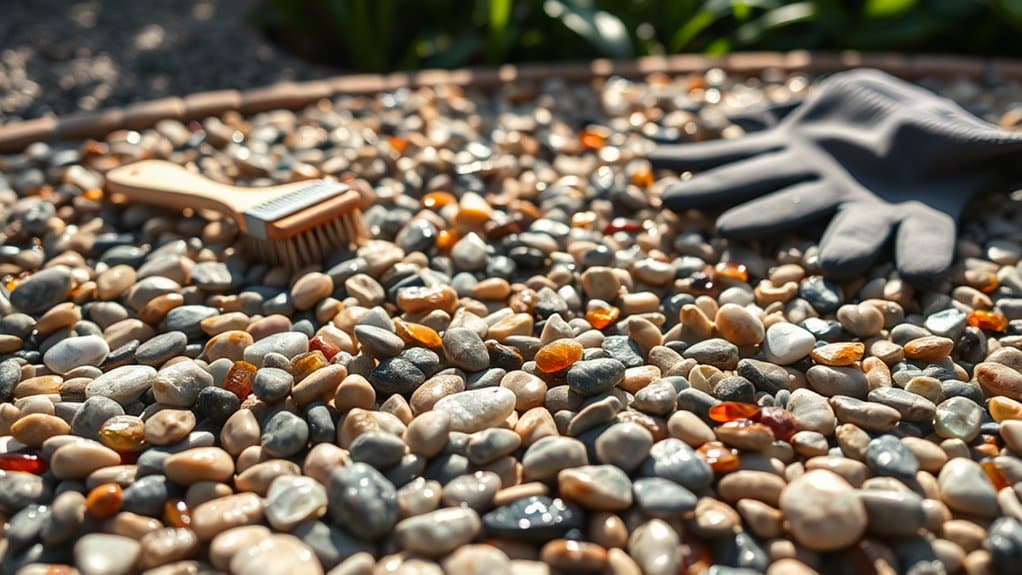
Understanding Resin-Bound Gravel
Resin-bound gravel offers a practical and smart-looking option for your driveway or garden paths. The system mixes special resins (like epoxy) with stones and gravel, much like combining ingredients for a cake.
A proper mixer blends everything thoroughly before it's laid onto a prepared surface at 12-24mm thick – about the height of two pound coins stacked together. This Durable surface results from the strong bond between the resin and gravel, ensuring longevity and resilience under heavy foot traffic. Additionally, the installation process must adhere to SUDS regulations, ensuring effective drainage capabilities.
Once set, you're left with a robust surface that water can drain through naturally, helping prevent puddles and flooding during typical British weather. It's particularly useful for front gardens where you need a solid surface that still meets planning requirements for drainage.
The finished result looks neat and seamless, rather like a premium gravel drive but without loose stones scattered about. The surface stands up well to our climate and regular use, making it a sound choice for both domestic and commercial properties across the UK.
Unlike traditional gravel, you won't need to keep raking it back into place or worry about stones getting stuck in your car tyres.
Maintenance Requirements for Resin-Bound Gravel
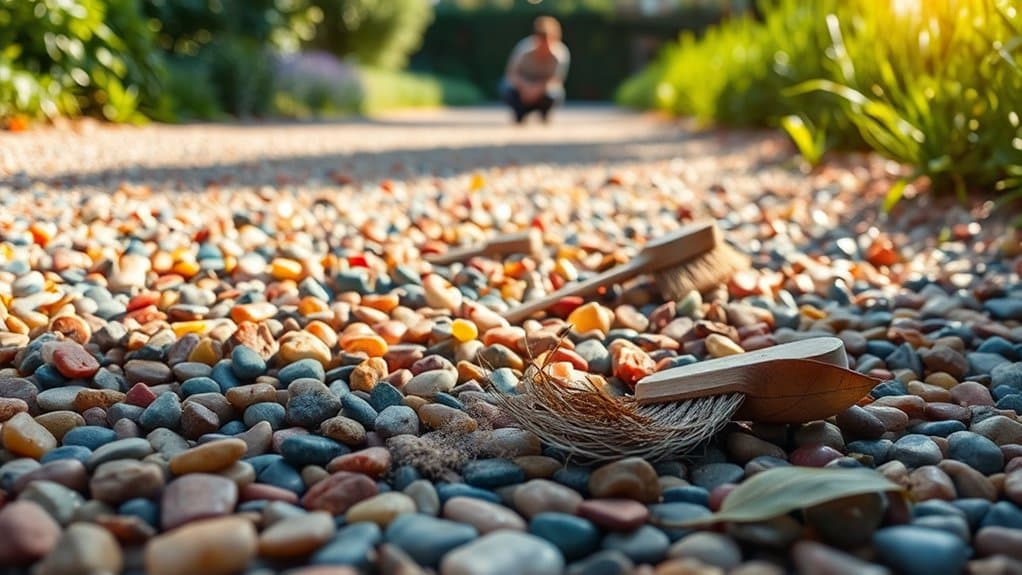
Resin-bound gravel needs regular upkeep to stay looking smart and lasting well.
Basic maintenance includes:
- Regular sweeping to clear leaves and loose debris
- Jet washing every few years at low pressure (150 bar) with a wide-angle fan nozzle
- Cleaning with ordinary household detergents – avoid harsh chemicals that damage the resin
- Treating moss and algae in shaded spots with warm, soapy water
Think of it like caring for a car – routine cleaning prevents bigger problems later. Regular upkeep minimizes long-term issues and enhances its surface longevity, which can help ensure the driveway lasts 15 to 25 years with proper care.
A quick sweep once a week and occasional deeper clean will keep your surface looking fresh and extend its life.
Most UK homeowners manage the maintenance easily with standard garden tools and cleaning supplies.
Common Issues and Their Solutions

Moss and algae commonly appear on resin-bound gravel in shaded spots around British gardens and driveways. Regular cleaning with a specialist resin cleaner or a gentle pressure washer will sort the problem. For oil marks and stains, tackle them straightaway with a degreaser – waiting too long means they'll be harder to shift and might leave permanent marks. Additionally, addressing drainage issues can help prevent the accumulation of moisture that contributes to moss growth, so ensuring proper drainage maintenance is critical. The quicker you deal with these issues, the better your surface will look.
Moss and Algae Removal
Moss and algae growth on resin-bound surfaces becomes particularly troublesome in shaded or poorly draining areas across the UK. The solution requires straightforward prevention and control methods:
| Cause | Solution | Tools Needed |
|---|---|---|
| Poor Drainage | Ensure porous subbase | Pressure washer |
| Shading | Cut back overhanging plants | Stiff brushes |
| Organic Debris | Clear leaves and debris regularly | Stiff brooms |
| Incorrect Installation | Check installation quality | – |
| Environmental Factors | Regular jet washing | Flat spraying nozzles |
A pressure washer with suitable nozzles works effectively against moss and algae. Standard household cleaners or specialist treatments both tackle the problem well. Regular sweeping and proper maintenance prevent regrowth, keeping resin-bound surfaces safe and presentable throughout British weather conditions.
Oil and Stain Treatment
Oil and Chemical Stain Treatment
Quick action is vital when dealing with oil or chemical spills on resin-bound gravel surfaces. Left untreated, these substances can damage both appearance and structure.
For oil spills:
- Scatter cat litter or bicarbonate of soda immediately to absorb excess oil
- Apply washing-up liquid or a gentle household cleaner
- Leave for 10 minutes
- Rinse thoroughly with clean water
For chemical spills (like brake fluid or battery acid):
- Use warm water to neutralise and rinse
- Clean promptly to prevent surface damage
Check your driveway or path regularly for signs of staining – common culprits include car leaks and garden chemicals.
Catching spills early makes them much easier to treat.
Environmental Benefits and Considerations
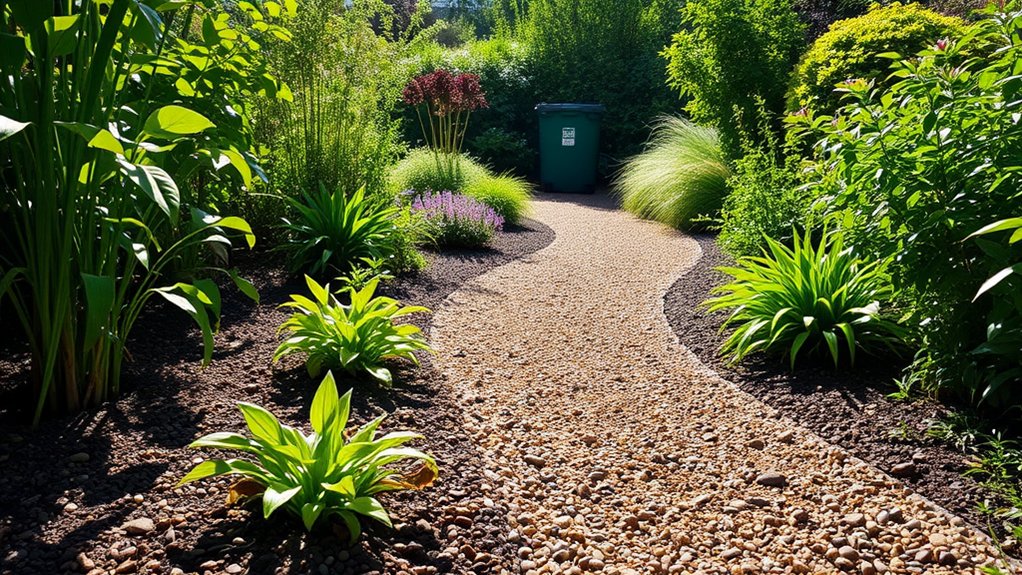
Resin-bound gravel driveways offer more than just a sturdy surface – they're an environmentally smart choice that complies with UK Sustainable Urban Drainage Systems (SuDS).
The permeable surface lets rainwater filter naturally into the ground, reducing flood risks and supporting local wildlife. Unlike traditional concrete or tarmac, these driveways help maintain natural water cycles and cut down on harmful surface runoff, particularly useful during Britain's wet weather.
It's a practical way to make your property more eco-friendly whilst meeting modern drainage requirements.
Sustainable Urban Drainage
Sustainable Urban Drainage Systems (SuDS) manage rainwater and surface water effectively in UK towns and cities, reducing flood risks and improving our urban environment.
Key benefits of SuDS:
- Flood Prevention: Slows water flow during heavy rainfall, protecting homes and businesses
- Cleaner Water: Filters out pollutants from road runoff and other urban sources
- Natural Water Cycle: Helps replenish underground water supplies through natural drainage
Using materials like permeable paving and resin-bound gravel allows water to soak through naturally rather than running off into already-strained sewers.
This approach works particularly well in British conditions, where frequent rainfall demands reliable drainage solutions.
SuDS create greener urban spaces whilst protecting our communities from flooding – a practical solution for modern British cities.
Biodiversity Impact
Resin-bound gravel supports biodiversity in our urban spaces whilst improving drainage. This porous surface lets rainwater soak naturally into the ground, helping maintain water tables and creating better conditions for local plants and wildlife.
Much like a natural filter, the gravel traps pollutants before they reach the soil, protecting nearby ecosystems. You'll often spot various plants and small creatures thriving around these surfaces, particularly in garden paths and driveways.
The long-lasting nature of resin-bound gravel means fewer replacements and less disruption to established habitats. For anyone looking to make their outdoor space more wildlife-friendly whilst managing water runoff, it's an excellent choice that helps create sustainable urban environments where nature and people can thrive together.
Comparison With Alternative Surfacing Materials
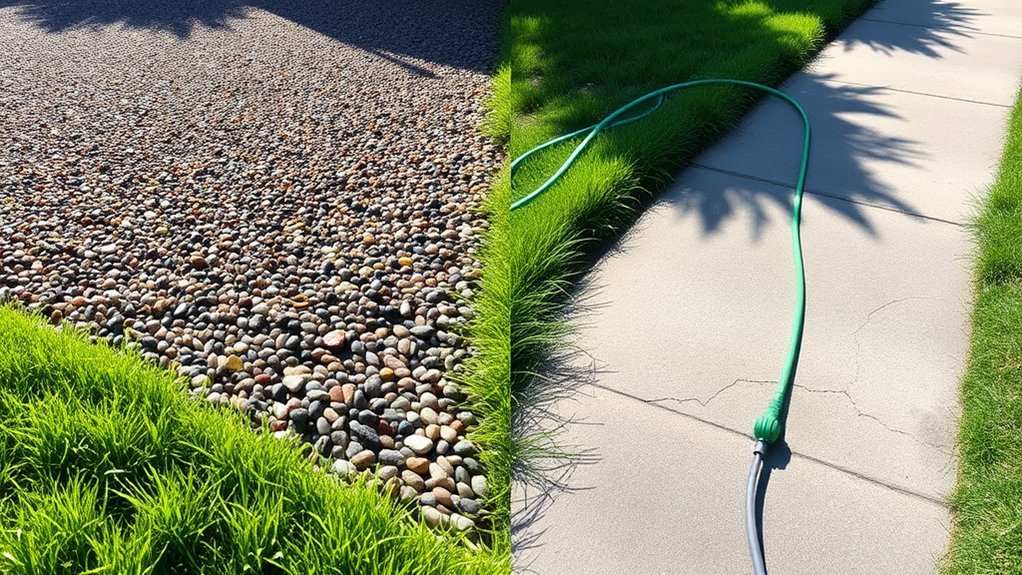
Comparison With Alternative Surfacing Materials
Different surfacing options each have their own strengths and weaknesses for UK properties.
Resin-bound gravel stands out with its SUDS-compliant permeable surface and smart finish.
Traditional loose gravel, whilst cheaper, often ends up scattered and needs regular tidying.
- Resin-bound gravel: Lasts up to 30 years with minimal fuss
- Loose gravel: Budget-friendly but needs frequent maintenance
- Tarmac and concrete: Tough but poor drainage, often causing puddles
These differences matter when choosing what's right for your driveway or path.
Think about how much time you're willing to spend on upkeep versus the initial cost.
Long-Term Maintenance and Cost Implications
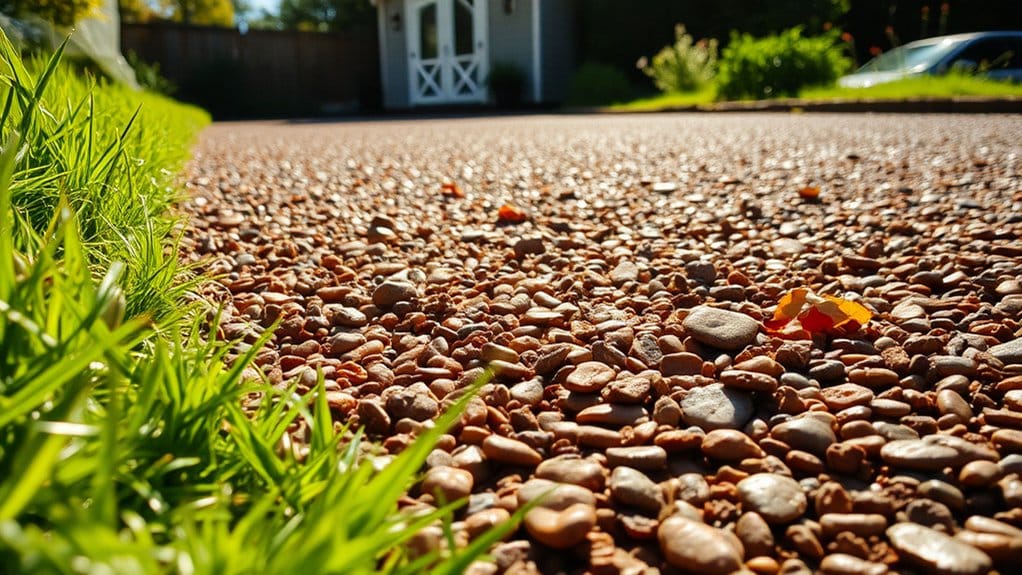
Clear financial benefits come with resin-bound gravel, despite higher upfront costs.
Whilst installation may set you back more initially, you'll spend less on maintenance over the years compared to traditional surfaces.
To protect your investment, stick to basic upkeep:
- Regular brushing and hosing down
- Quick removal of leaves and debris
- Yearly professional check-ups
- Swift repairs of any small cracks
British weather demands particular attention – ensure proper drainage during rainy spells and careful de-icing in winter.
Mind you don't use metal shovels for snow clearing, as they can damage the surface.
Quality materials and proper fitting by certified installers might cost more at the start, but they're worth every penny for avoiding hefty repair bills down the line.
For UK homeowners seeking a durable, attractive surface that makes financial sense long-term, resin-bound gravel ticks all the boxes.
Frequently Asked Questions
Can Resin-Bound Gravel Be Installed in Cold Weather?
Resin-bound gravel installation is possible in cold weather, but it requires careful planning. Cold temperatures can slow down curing times and affect how well the resin bonds – think of how treacle becomes thicker and harder to work with in winter. For best results, avoid laying during frosty conditions or when temperatures drop below 5°C. Moisture is another crucial factor; a damp surface won't allow proper bonding, much like trying to stick tape to a wet surface.
How Does Resin-Bound Gravel Affect Drainage Systems?
Resin-bound gravel creates a porous surface that effectively manages rainwater. Water flows through the tiny gaps between stones, preventing surface pooling and reducing flood risks. This natural drainage helps replenish groundwater levels whilst keeping pathways and driveways clear – a practical solution for Britain's wet weather.
Is Resin-Bound Gravel Suitable for Heavy Vehicle Traffic?
Resin-bound gravel can handle heavy vehicles well when properly laid. For best results, install it over a solid concrete base. Without this foundation, frequent lorry or coach traffic may cause the surface to wear down more quickly.
What Colors and Finishes Are Available for Resin-Bound Gravel?
Resin-bound gravel comes in numerous colours, from classic gold and cream to contemporary silver and rose pink. Choose between smooth or textured finishes to match your outdoor space. The range lets you customise your driveway or garden path to complement your property's style.
Can I Install Resin-Bound Gravel Myself, or Should I Hire a Professional?
Resin-bound gravel installation is possible as a DIY project, but it's not a simple weekend job. You'll need proper surface preparation, high-quality materials and decent weather conditions (dry and above 5°C). Whilst DIY can save money, mistakes are costly to fix – think wonky surfaces or poor drainage. For driveways and larger areas, a professional installer brings expertise and proper equipment, ensuring a durable finish that meets British standards. Worth considering DIY only for small garden paths or patios if you're particularly handy.
Conclusion
Resin-bound gravel requires minimal maintenance, but it's not completely hands-free. While it's more durable than loose gravel, you'll still need to sweep it occasionally and remove any fallen leaves or debris. A quick power wash once or twice a year keeps it looking fresh, and treating any stubborn stains promptly prevents long-term marking. For UK weather conditions, it's worth noting that moss might develop in shadier areas, though it's easily managed with standard patio cleaner. Overall, it's a practical choice that needs far less upkeep than traditional gravel or block paving, whilst maintaining its smart appearance.
